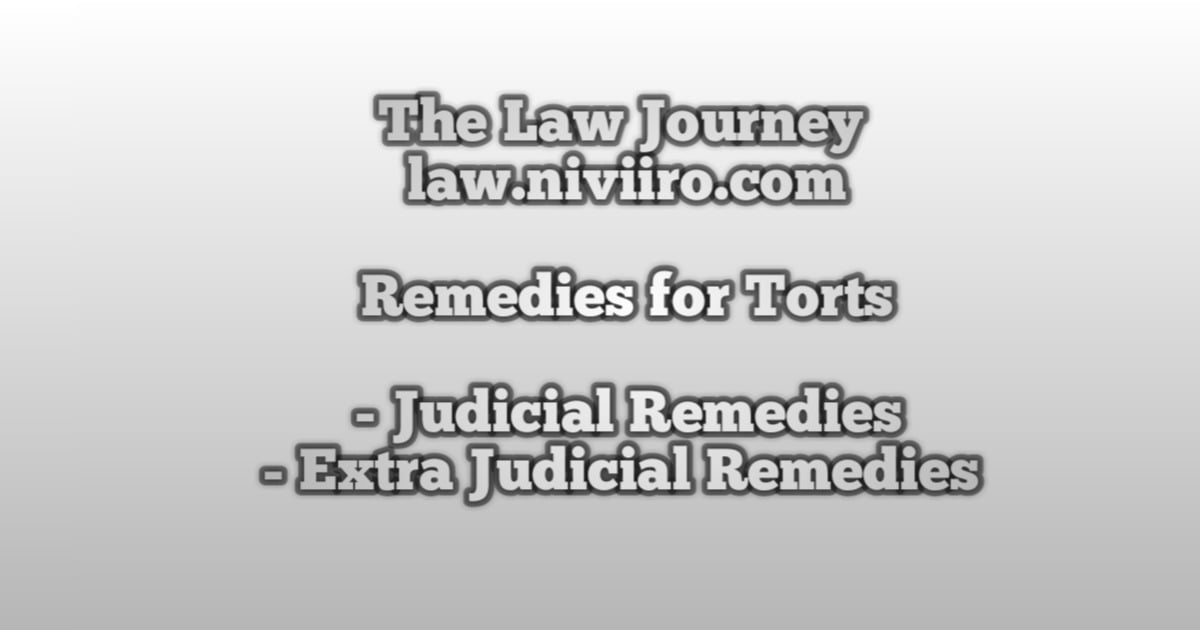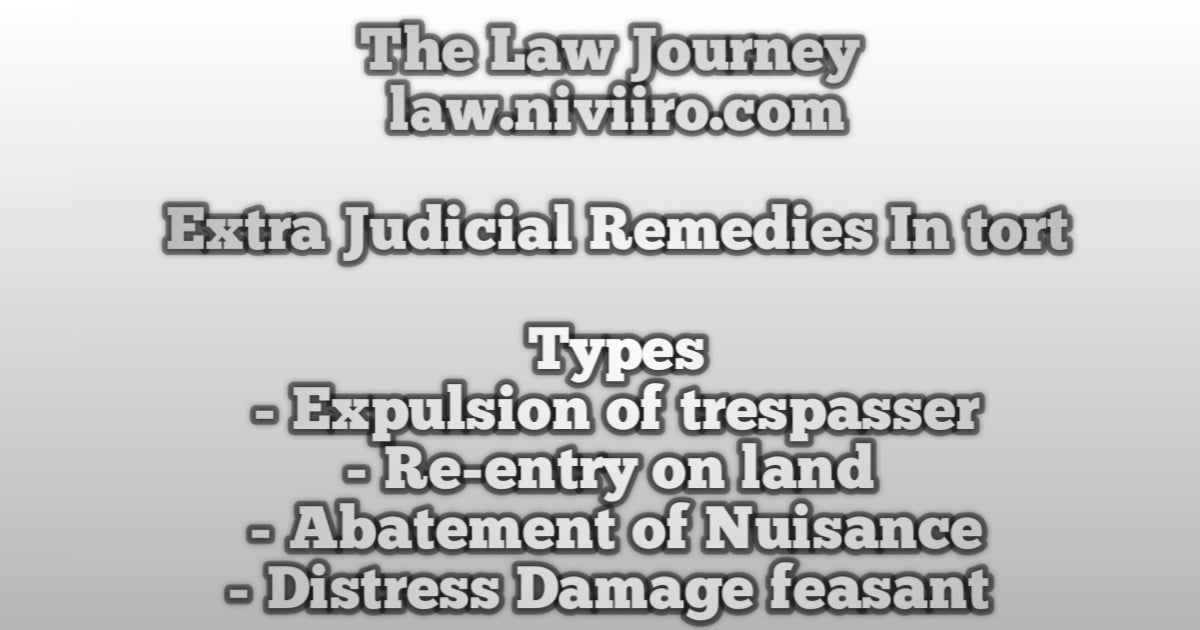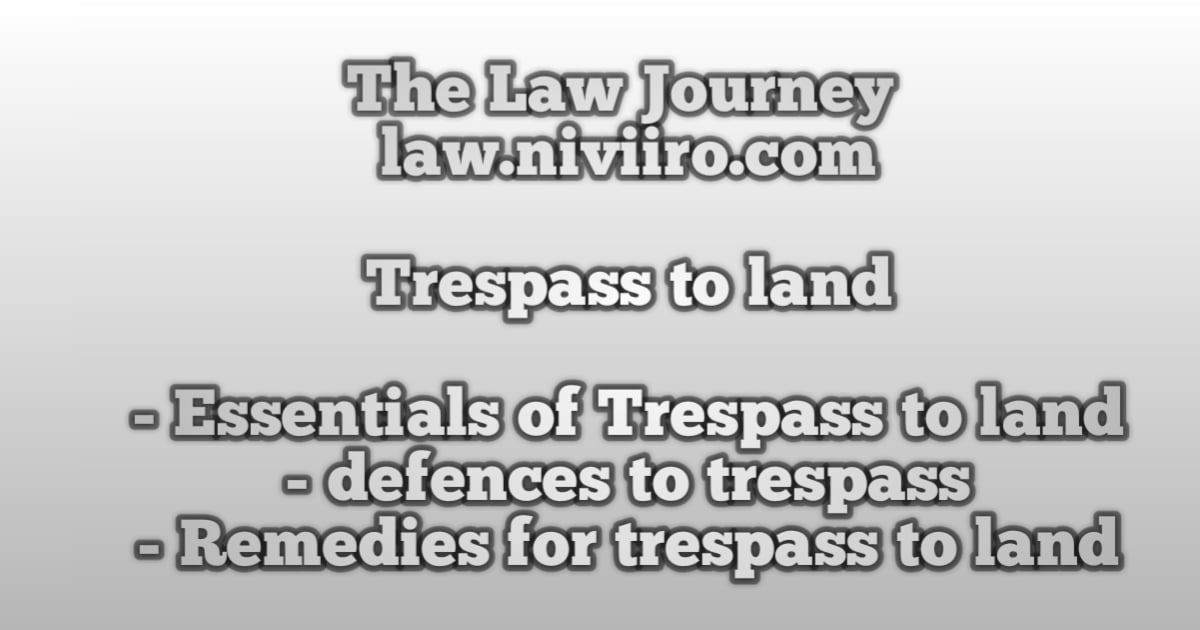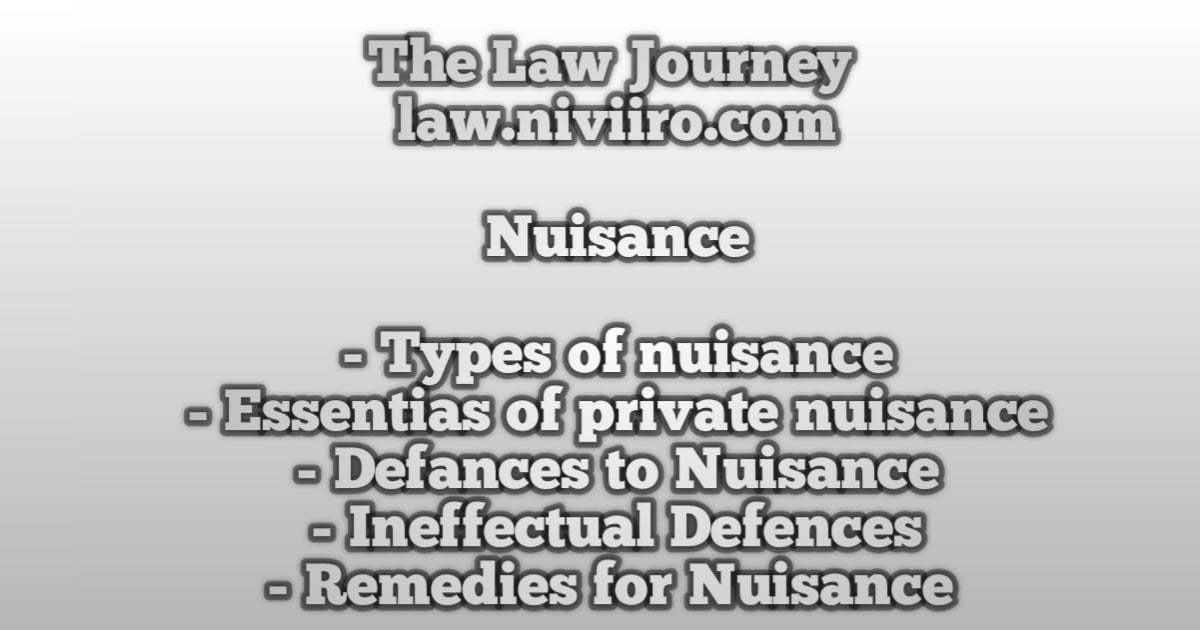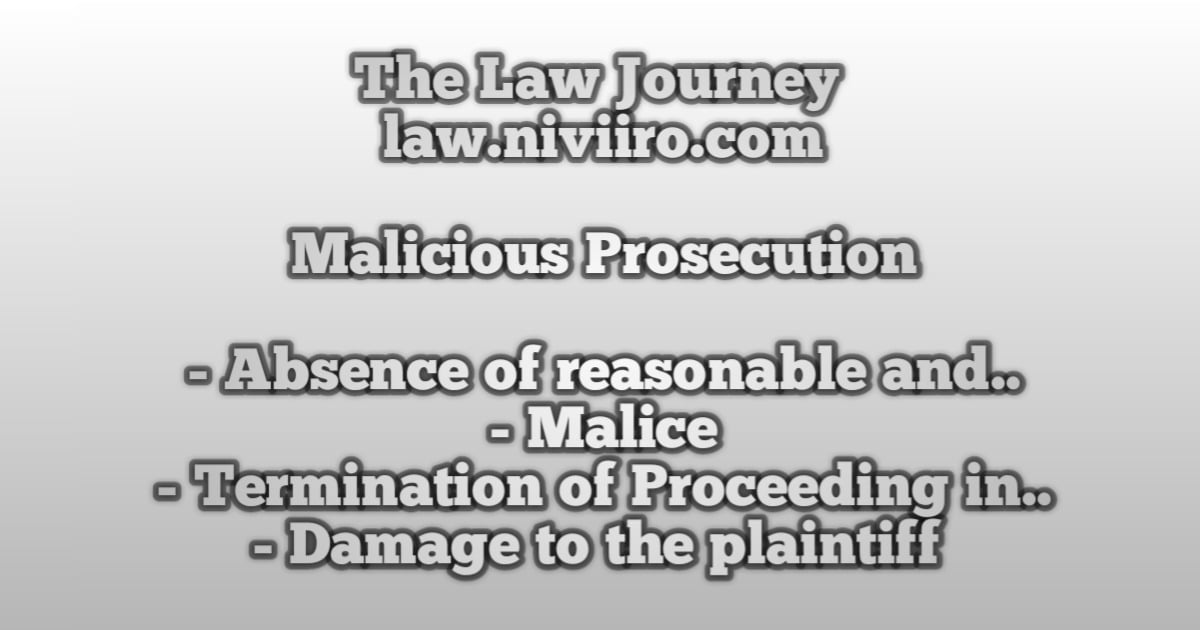Remedies for torts are of two kinds: Judicial and Extra judicial Remedies.
Judicial remedies
Judicial remedies are those which are afforded by the act of law, viz.
Judicial remedies:
(1) awarding of damages;
(2) granting of injunction; and
(3) restitution of property.
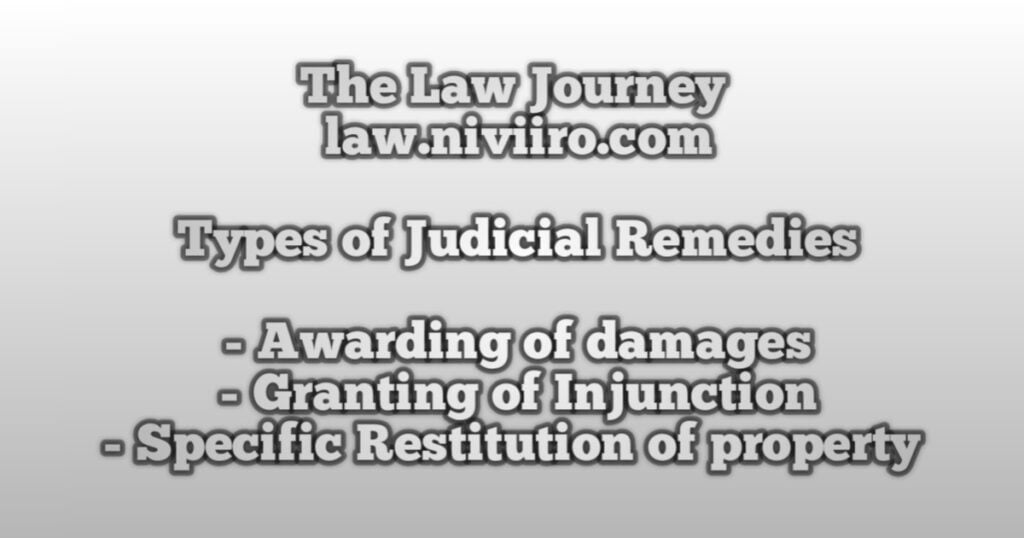
Awarding of Damages
The most significant remedy available to the plaintiff is damages. Damages are monetary compensation awarded by the law to a person for harm caused by the wrongful act of another. They are intended not only to compensate the wounded individual, but also to punish the guilty in order to stop him from repeating the same conduct in the future.
Kinds of Damages
There are four kinds of damages:
(1)contemptuous, (2) nominal, (3) ordinary, and (4) exemplary.
Other dmages Prospective and Continuing Damages, General and Special Damages.
Contemptuous Damages
Such damages are given where it is determined that the action should not have been instituted in the first place. The sum given is relatively little because the court has a poor view of the plaintiff’s claim and believes that, although suffering more damage, the plaintiff does not deserve to be completely paid since there is no moral basis for it. For example, the defendant’s violence on the plaintiff is shown to be the result of an inflammatory comment made by the plaintiff.
Nominal Damages
When there has been infringement of the plaintiff’s legal right but he has suffered no loss thereby (injuria sine damno) the law awards him nominal damages in recognition of his right. The sum awarded may be nominal, say, one or two rupees. For example, in cases of infringement of absolute rights of personal security (e.g. assault) and property (e.g. bare trespass, invasion of a right of easement, etc.).
In the case Ashby v. White, 1703 (2) Lord Rayam, 938, the defendant wrongfully refused to register a duly tendered vote of the plaintiff in the parliamentary elections in England. The plaintiff suffered no loss as the candidate to whom he wanted to cast his vote, got elected. The Court held the defendant liable for a sum of £ 5 alongwith costs of the case.
Ordinary Damages
Also known as’substantial’ or ‘compensatory’ damages, they are granted when it is required to appropriately recompense the plaintiff for the hurt he has really suffered. The amount granted may be big or minor, depending on the extent of the plaintiff’s injury. The plaintiff’s own estimate is considered the upper limit. Such damages are referred regarded as ‘compensatory’ since they recompense the plaintiff rather than punishing the wrongdoer, which is referred to as ‘punitive.’
Exemplary damages
Where it is not possible to compute recompense in monetary terms. The court may give aggravated (high) damages after considering the action, purpose, and other factors. This is outstanding. The goal is to hold the perpetrator accountable and to discourage and punish similar people. The compensation is far greater than the loss sustained.
Huckle v. Money: D, a government employee, searched P’s home using a nameless search warrant. D was sued by P. D was found responsible. The court ordered exemplary damages because entering without sufficient authorization amounted to an infringement on P’s liberty.
Other damages
Prospective and Continuing Damages
Prospective or ‘future’ damages are compensation for damages that are very certainly the outcome of the defendant’s wrongful act but have not yet occurred at the time the case is decided. For example, if a person is paralysed in an accident, the damages awarded to him may include not only the loss incurred up to the date of the action, but also future expected harm to him in relation to that impairment, such as impacts on capacity to work, enjoyment of his regular life, and so on.
General and Special Damages
General damages are those imposed by the law in the event of a violation of a legal right. They are not need to be supported by evidence. They occur as a result of legal inference even though no monetary damage can be demonstrated. When the defendant infringes the plaintiff’s absolute legal rights, general damages of at least a nominal sum are inferred [Ashby v White (1704) 2 Ld Raym 938].
Special damages are those that the law will not deduce from the nature of the alleged act. They must be asserted in the pleadings and established at trial. The term “particular dam-age” refers to the real and temporal loss that has happened. Such harm is sometimes referred to as “explicit loss,” “specific damage,” “damage in reality,” and so on. For example, in cases brought for a public nuisance, such as the blocking of a river or a roadway, “special harm” refers to the actual and specific loss that the plaintiff must state and establish beyond what the general public suffers. [Ratcliffe v Evans, 2 QB 524 (1892)]
Granting of Injunction
Injunctions, which are most typically employed in the torts of nuisance and trespass, can give a remedy in some tort disputes. An injunction is a court order that forbids someone from doing something or requires someone to do something. It is a just solution. In order to get an injunction, a claimant must meet the following equity maxims: he who seeks equity must come to court with clean hands, equity does nothing in vain, and delay destroys equity.
Types of Injunction in tort
There are mainly 4 types of injuction.
- Temporary Restraining Order, 2. Permanent, 3. Mandatory Injunction, 4. Preventive Injunctions
Temporary Restraining Order
Temporary restraining orders are a type of injunction that is both time and scope limited. Temporary restraining orders allow the court extra time to consider whether a preliminary injunction should be granted. Pre-trial restraining orders are granted and are only temporary. A court can grant temporary restraining orders without previously having a hearing. It is not possible to challenge the decision to issue or refuse a temporary restraining order.
Permanent
A permanent injunction is granted after trial. Permanent injunctions are court orders that require a person to start or stop doing something forever. Permanent injunctions are final judgements, which means the court has made its ultimate decision on how to resolve a dispute involving many parties. Permanent injunctions are given only when monetary damages are insufficient.
Mandatory Injunction
A mandatory injunction, the most stringent of all injunctions, orders the defendant to do something. For example, if a court mandates the removal of a building or structure owing to improper construction, this is a required injunction.
Preventive Injunctions
A preventive injunction is a court order that requires a person to refrain from doing a preventative, prohibitive, or negative action. The injunction seeks to avoid a threatened injury, maintain the status quo, and prohibit the continuation of a continuing wrong.
Specific Restitution of property
Specific restitution of property is one of the judicial remedies available in the tort. in this injuction if the plaintiff has been wrongfully dispossed from his property which may be movable or immovable. If the plaintiff can’t take back his dispossed property from the defendant by self. he has a judicial remedy to move the court for get his dispossed property.
Related Post
What types of remedies are available in the tort ?
Remedies for torts are of two kinds: Judicial and Extra judicial Remedies.
Types of judicial remedies in the tort ?
Judicial remedies are those which are afforded by the act of law, viz. (1) awarding of damages; (2) granting of injunction; and (3) Restitution of property.
What do you mean by Injuction ?
An injunction is a court order that forbids someone from doing something or requires someone to do something. It is a just solution. In order to get an injunction, a claimant must meet the following equity maxims: he who seeks equity must come to court with clean hands, equity does nothing in vain, and delay destroys equity.
Types of Injunction in tort ?
There are mainly 4 types of injuction.
1. Temporary Restraining Order, 2. Permanent, 3. Mandatory Injunction, 4. Preventive Injunctions
Reference
- P.S.A. Pillai’s – Law Of Tort
- Law of Torts by RK Bangia (22nd Edition)
- Universals Law of Torts
- Law of Torts by J.N. Pandey
- A.K Jain law of torts
- Law of Torts by Ratanlal and Dhirajlal













